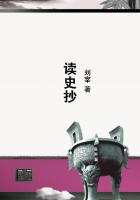People who could give such signs as these of their loyalty were by no means to be misgoverned with impunity. The English in the sixteenth century were, beyond all doubt, a free people. They had not, indeed, the outward show of freedom; but they had the reality. They had not as good a constitution as we have; but they had that without which the best constitution is as useless as the king's proclamation against vice and immorality, that which, without any constitution, keeps rulers in awe, force, and the spirit to use it. Parliaments, it is true, were rarely held, and were not very respectfully treated. The great charter was often violated. But the people had a security against gross and systematic misgovernment, far stronger than all the parchment that was ever marked with the sign-manual, and than all the wax that was ever pressed by the great seal.
It is a common error in politics to confound means with ends.
Constitutions, charters, petitions of right, declarations of right, representative assemblies, electoral colleges, are not good government; nor do they, even when most elaborately constructed, necessarily produce good government. Laws exist in vain for those who have not the courage and the means to defend them. Electors meet in vain where want makes them the slaves of the landlord, or where superstition makes them the slaves of the priest. Representative assemblies sit in vain unless they have at their command, in the last resort the physical power which is necessary to make their deliberations free, and their votes effectual.
The Irish are better represented in parliament than the Scotch, who indeed are not represented at all. But are the Irish better governed than the Scotch? Surely not. This circumstance has of late been used as an argument against reform. It proves nothing against reform. It proves only this, that laws have no magical, no supernatural, virtue; that laws do not act like Aladdin's lamp or Prince Ahmed's apple; that priestcraft, that ignorance, that the rage of contending factions, may make good institutions useless; that intelligence, sobriety, industry, moral freedom, firm union, may supply in a great measure the defects of the worst representative system. A people whose education and habits are such that, in every quarter of the world they rise above the mass of those with whom they mix, as surely as oil rises to the top of water, a people of such temper and self-government that the wildest popular excesses recorded in their history partake of the gravity of judicial proceedings, and of the solemnity of religious rites, a people whose national pride and mutual attachment have passed into a proverb, a people whose high and fierce spirit, so forcibly described in the haughty motto which encircles their thistle, preserved their independence, during a struggle of centuries, from the encroachments of wealthier and more powerful neighbours, such a people cannot be long oppressed.
Any government, however constituted, must respect their wishes and tremble at their discontents. It is indeed most desirable that such a people should exercise a direct influence on the conduct of affairs, and should make their wishes known through constitutional organs. But some influence, direct or indirect, they will assuredly possess. Some organ, constitutional or unconstitutional, they will assuredly find. They will be better governed under a good constitution than under a bad constitution.
But they will be better governed under the worst constitution than some other nations under the best. In any general classification of constitutions, the constitution of Scotland must be reckoned as one of the worst, perhaps as the worst, in Christian Europe. Yet the Scotch are not ill governed. And the reason is simply that they will not bear to be ill governed.
In some of the Oriental monarchies, in Afghanistan for example, though there exists nothing which an European publicist would call a Constitution, the sovereign generally governs in conformity with certain rules established for the public benefit; and the sanction of those rules is, that every Afghan approves them, and that every Afghan is a soldier.
The monarchy of England in the sixteenth century was a monarchy of this kind. It is called an absolute monarchy, because little respect was paid by the Tudors to those institutions which we have been accustomed to consider as the sole checks on the power of the sovereign. A modern Englishman can hardly understand how the people can have had any real security for good government under kings who levied benevolences, and chid the House of Commons as they would have chid a pack of dogs. People do not sufficiently consider that, though the legal cheeks were feeble, the natural checks were strong. There was one great and effectual limitation on the royal authority, the knowledge that, if the patience of the nation were severely tried, the nation would put forth its strength, and that its strength would be found irresistible. If a large body of Englishmen became thoroughly discontented, instead of presenting requisitions, holding large meetings, passing resolutions, signing petitions, forming associations and unions, they rose up; they took their halberds and their bows; and, if the sovereign was not sufficiently popular to find among his subjects other halberds and other bows to oppose to the rebels, nothing remained for him but a repetition of the horrible scenes of Berkeley and Pomfret, He had no regular army which could, by its superior arms and its superior skill, overawe or vanquish the sturdy Commons of his realm, abounding in the native hardihood of Englishmen, and trained in the simple discipline of the militia.
It has been said that the Tudors were as absolute as the Caesars.















